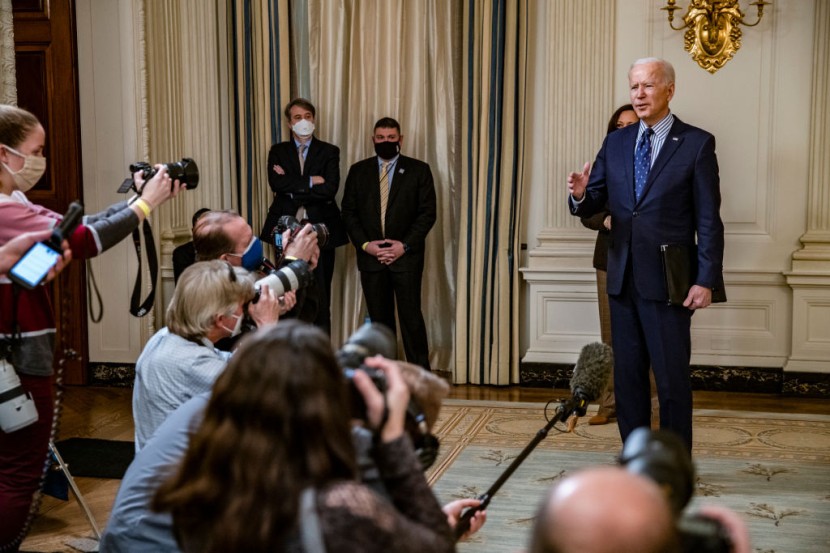As the Senate has already passed the COVID-19 relief bill, many Americans can receive up to $1,400 stimulus checks as early as March 13. The Senate-approved bill also includes expanded unemployment benefits and increased child tax credits.
Over Republican resistance, the Senate passed a broad pandemic relief package on Saturday, bringing President Joe Biden closer to a historic political win that will provide most Americans with $1,400 checks and direct billions of dollars to colleges, state and local governments, and corporations.
After a long overnight debate session, the bill passed 50-49 on a party-line vote and now goes back to the House for final passage, which could happen early next week. Democrats claimed that their "American Rescue Plan" would assist in the fight against the pandemic and recover the economy.
According to WTHR, the $1.9 trillion package was opposed by Republicans as being too costly. Since last spring, Congress has passed five previous virus bills worth about $4 trillion.
Read also: Senate Finally Approves Biden's $1.9 Trillion COVID-19 Stimulus Bill
What's in the Senate COVID-19 relief bill?

WASHINGTON, DC - MARCH 06: President Joe Biden stops to answer questions from reporters after speaking in the State Dining Room with Vice President Kamala Harris behind him following the passage of the American Rescue Plan in the U.S. Senate at the White House on March 6, 2021 in Washington, DC. The Senate passed the latest COVID-19 relief bill by 50 to 49 on a party-line vote, after an all-night session.
- Unemployment benefits extension - The federal government's expanded unemployment benefits will be extended until September 6 at a weekly rate of $300.
- Third stimulus checks - A single taxpayer will receive a cash payout of $1,400, and a married couple filing together will receive $2,800, plus $1,400 for each dependent.
- Local and state government funding - The bill will give $350 billion to state and local governments and tribal governments for expenses sustained between now and 2024.
- School funding - A total of $130 billion in new funding for schools for children in kindergarten to 12th grade is included in the measure.
- Businesses funding - A $25 billion fund will be allocated to a new scheme for restaurants and bars that the pandemic has impacted.
- Testing and vaccines - With new investments to increase laboratory capability and set up mobile research units, the bill includes $46 billion to expand federal, state, and local monitoring for COVID-19 and strengthen contract tracing capabilities.
- Health care - Parts in the bill promote long-held Democratic goals, such as expanding access under Obama's Affordable Care Act.
- Bigger tax breaks for households - Many taxpayers can save up to $2,000 per child on their federal income tax bill under existing legislation. The bill will raise the tax break to $3,000 for children aged 6 to 17 and $3,600 for children under 6.
- Rental and home assistance - The bill allocates approximately $30 billion to help low-income families and the unemployed pay for rent and electricity and provide vouchers and other assistance to the homeless.
Read also : Stimulus Checks: Between the Payments in Each Round, Here Is a Major Difference You Should Not Miss
When the IRS could send your next stimulus check
Given the gaps between the Senate and House versions of the COVID-19 relief bill, the bill will return to the House early next week for final passage before being sent to President Biden for signature, CBS News via MSN reported. Based on the timeline for the previous round of checks, the IRS could begin distributing the checks within days to one week after the bill is signed into law - perhaps as early as the weekend of March 13.
However, the possibility of further changes to the qualifications for those obtaining the checks complicates matters. Also, checks may be accepted and ready to go in the midst of tax season, causing the IRS' processing and distribution schedules to be disrupted, as per Newsweek. Though some Americans may collect checks by the end of the month, the first two rounds of stimulus payments have been delayed, and many Americans have yet to receive their checks.
Sorry, not everyone may qualify for the third stimulus check
A proposed Senate bill approved on Saturday indicated fewer Americans would get a third stimulus check, as per Yahoo Finance. The new plan was introduced to get Democrats in the Senate together, who were split over the stimulus check phase-out rate so that President Biden's $1.9 trillion COVID-relief bill could pass. The House of Representatives originally approved the president's stimulus plan, but due to this and other amendments enacted by the Senate, they would have to vote on it again.
As a result, the third stimulus check for those with incomes above a certain level would be cut - potentially to zero - at a higher pace under the new bill as revised by the Senate than under the House-passed bill. According to the Institute on Taxation and Economic Policy, this means that under the new measure, almost 12 million fewer Americans will get a third stimulus check than under the House-passed version.
Read also: Stimulus Bill: Senate Democrats Agree To Cut Unemployment Benefits in Last Minute Deal
© 2026 HNGN, All rights reserved. Do not reproduce without permission.








